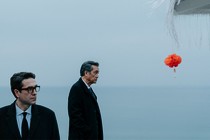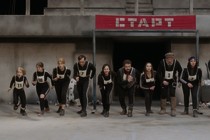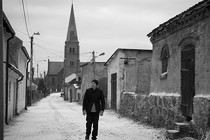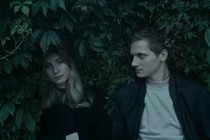Ederly: More than just a cinematic conundrum
- Polish filmmaker Piotr Dumala continues to hone his distinctive signature style and aesthetics in his sophomore feature

Multi-talented director Piotr Dumala is competing at the New Horizons Festival in Wroclaw with his latest offering, Ederly [+see also:
trailer
film profile]. Dumala is a Polish animation veteran, whose signature style combines black humour with a dream logic that verges on the surreal. Both elements can be found in his famed animated adaptation of Crime and Punishment as well as Franz Kafka, an animated biopic loosely based on the eponymous writer’s diaries. In his latest work, the filmmaker adapts his own novel, published in instalments in the Kino magazine, into a live-action fiction feature.
The opening shot follows a stranger named Slow (portrayed by Mariusz Bonaszewski, who starred in Dumala’s previous feature, The Forest) venturing, under the veil of darkness, to a small nearby rural town, Ederly. Stopping to ask for directions, he reveals the reason behind his visit: he is a travelling restorer commissioned by the local church. The lone renovator wanders through abandoned streets, entering a house where he is, curiously enough, warmly welcomed. At first, what appears to conform to the template of a stranger invading a family and disrupting the fine balance in the microcosm of progress, akin to Pier Paolo Pasolini’s parable Teorema, turns out to be its inverted counterpart. Dumala rearranges the elements in the equation, causing Slow to be the disturbed subject.
Dumala crafts a highly Kafkaesque protagonist, respectably reminiscent of Josef K, as Slow becomes trapped in a quicksand of circumstances he struggles to comprehend. By blurring the line between Slow’s genuine bewilderment and the gnawing suspicion of him being an unreliable narrator, the protagonist’s initial identity dissolves, and he adopts those imposed on him by the townsfolk – a lost son, a brother, a fiancé, a lover. Dumala’s film shifts almost organically, according to the protagonist’s puzzling appropriation of these roles, rather like a carousel of genre snapshots: a forbidden romance, a parable of the prodigal son, a murder mystery, a twisted comedy and a crime-thriller.
The chameleon-like nature of Ederly's genres functions through the application of dream logic, which also positions the film on the edge of reality and fantasy. Adam Sikora’s black-and-white photography breathes an ominous air and weightily contributes to the aura of timelessness established in the minimalistic and melancholic ambiance of the film’s rustic Eastern European locations, in a subtle nod to the works of Béla Tarr.
The economical use of space carries the air of a theatrical staging. However, the DoP and the director make full use of the available space enveloping the delusional conversations, creating tension and eeriness right to the film’s anti-climax. Dumala taps into the theatre of the absurd for the script, never compromising on the film’s visual anchorage in realism, nor the signature style he developed in his previous feature, The Forest, with its metaphorical language, visual austerity and evocative imagery. Ederly, being an existentialist parable and an off-kilter comedy at the same time, comes as close to resembling the hypothetical love child of Franz Kafka and Harold Pinter as possible, while also cementing Piotr Dumala’s authorial voice in its own right.
Ederly was produced by Andersa Street Art and Media, and co-produced by Heliograf, D35 and Film Factory. The Polish Film Institute co-financed the project.
Did you enjoy reading this article? Please subscribe to our newsletter to receive more stories like this directly in your inbox.




















